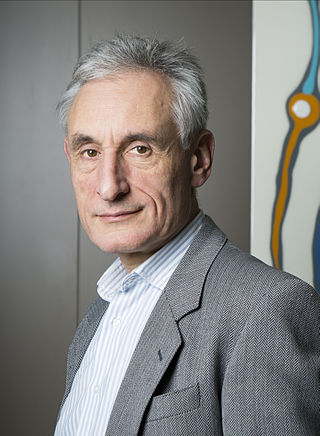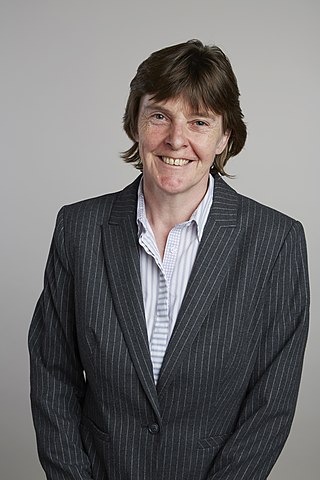
The Royal Society of Edinburgh (RSE) is Scotland's national academy of science and letters. It is a registered charity that operates on a wholly independent and non-partisan basis and provides public benefit throughout Scotland. It was established in 1783. As of 2021, there are around 1,800 Fellows.
The Chartered Institute of Library and Information Professionals is a professional body for librarians, information specialists and knowledge managers in the United Kingdom.

The School of Informatics is an academic unit of the University of Edinburgh, in Scotland, responsible for research, teaching, outreach and commercialisation in informatics. It was created in 1998 from the former department of artificial intelligence, the Centre for Cognitive Science and the department of computer science, along with the Artificial Intelligence Applications Institute (AIAI) and the Human Communication Research Centre.
The Engineering and Physical Sciences Research Council (EPSRC) is a British Research Council that provides government funding for grants to undertake research and postgraduate degrees in engineering and the physical sciences, mainly to universities in the United Kingdom. EPSRC research areas include mathematics, physics, chemistry, artificial intelligence and computer science, but exclude particle physics, nuclear physics, space science and astronomy. Since 2018 it has been part of UK Research and Innovation, which is funded through the Department for Business, Energy and Industrial Strategy.
The Doctor of Engineering is a professional doctorate in engineering and applied science. An EngD is a terminal degree similar to a PhD in engineering but applicable more in industry rather than in academia. The degree is usually aimed toward working professionals.
The Jason Farradane Award is made each year by the UK eInformation Group (UKeiG), a specialist group within the Chartered Institute of Library and Information Professionals. The award is given to an individual or a group of people in recognition of outstanding contribution to the information profession, by meeting one or more of the following criteria:
Johanna Doris Moore FRSE is a computational linguist and cognitive scientist. Her research publications include contributions to natural language generation, spoken dialogue systems, computational models of discourse, intelligent tutoring and training systems, human-computer interaction, user modeling, and knowledge representation.

Andrew Blake FREng, FRS, is a British scientist, former laboratory director of Microsoft Research Cambridge and Microsoft Distinguished Scientist, former director of the Alan Turing Institute, Chair of the Samsung AI Centre in Cambridge, honorary professor at the University of Cambridge, Fellow of Clare Hall, Cambridge, and a leading researcher in computer vision.
Ursula Hilda Mary Martin is a British computer scientist, with research interests in theoretical computer science and formal methods. She is also known for her activities aimed at encouraging women in the fields of computing and mathematics. Since 2019, she has served as a professor at the School of Informatics, University of Edinburgh.

Jane Elizabeth Hillston is a British computer scientist who is professor of quantitative modelling and former head of school in the School of Informatics, University of Edinburgh, Scotland.

Sir Nigel Richard Shadbolt is Principal of Jesus College, Oxford, and Professorial Research Fellow in the Department of Computer Science, University of Oxford. He is chairman of the Open Data Institute which he co-founded with Tim Berners-Lee. He is also a visiting professor in the School of Electronics and Computer Science at the University of Southampton. Shadbolt is an interdisciplinary researcher, policy expert and commentator. His research focuses on understanding how intelligent behaviour is embodied and emerges in humans, machines and, most recently, on the Web, and has made contributions to the fields of Psychology, Cognitive science, Computational neuroscience, Artificial Intelligence (AI), Computer science and the emerging field of Web science.
The Information School or iSchool of the University of Sheffield, in Sheffield, South Yorkshire, England, was founded in 1963 as the University's Postgraduate School of Librarianship and became in 2010 the first UK iSchool. Other names were the Postgraduate School of Librarianship and Information Science and Department of Information Studies (1981-2011). As of 2021, it employs 33 academic staff, 16 administrative/support staff, 6 affiliated research staff, and has about 65 research students. The current head of school is Professor Val Gillet.

Sir Anthony Charles Wiener Finkelstein is a British engineer and computer scientist. He is the President of City, University of London. He was Chief Scientific Adviser for National Security to HM Government until 2021.

Polly Louise Arnold is director of the chemical sciences division at Lawrence Berkeley National Laboratory and professor of chemistry at the University of California, Berkeley. She previously held the Crum Brown chair in the School of Chemistry, University of Edinburgh from 2007 to 2019 and an Engineering and Physical Sciences Research Council (EPSRC) career fellowship.

The Alan Turing Institute is the United Kingdom's national institute for data science and artificial intelligence, founded in 2015 and largely funded by the UK government. It is named after Alan Turing, the British mathematician and computing pioneer.

John Paul Attfield is a Professor of Materials science in the School of Chemistry at the University of Edinburgh and Director of the Centre for Science at Extreme Conditions (CSEC).
The Department of Information Studies is a department of the UCL Faculty of Arts and Humanities.

Alison Mary Etheridge is Professor of Probability and former Head of the Department of Statistics, University of Oxford. Etheridge is a fellow of Magdalen College, Oxford.

Dame Xiangqian "Jane" Jiang is a Professor of Precision Metrology at the Huazhong University Of Science And Technology (HUST) and University of Huddersfield. She is the Director of the EPSRC Future Advanced Metrology HUB and is the Royal Academy Engineering/Renishaw Chair in Precision Metrology.
Elham Kashefi is a Professor of Computer Science and Personal Chair in quantum computing at the School of Informatics at the University of Edinburgh, and a Centre national de la recherche scientifique (CNRS) researcher at the Sorbonne University. Her work has included contributions to quantum cryptography, verification of quantum computing, and cloud quantum computing.











